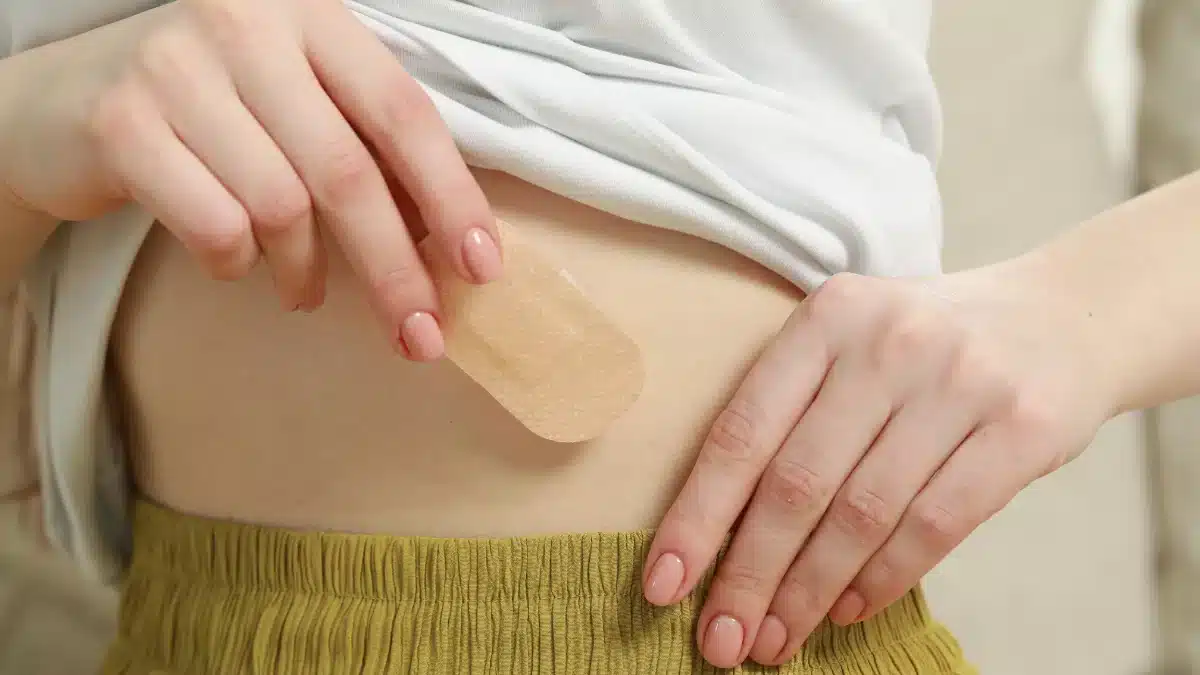Transdermal Estrogen Patch: A Complete Overview
The transdermal Estrogen patch is used in hormone therapy to treat various health conditions.
They serve many benefits, like steady hormone delivery, as Estrogen directly flows to the bloodstream.
However, there are a few side effects of these Estrogen patches.
This article will provide a complete overview of transdermal Estrogen patches, such as uses, dosing, side effects, and necessary precautions.
Uses of transdermal Estrogen patch
Some of the uses of transdermal Estrogen patches are described here:
Relieve menopausal symptoms
Transdermal Estrogen patches are commonly used to help alleviate the symptoms of Menopause.
It may include hot flashes, sweating, burning, irritation, and vaginal dryness.
They provide a consistent supply of Estrogen to balance hormone levels and reduce these discomforts.
Prevent postmenopausal Osteoporosis
These patches are also used to prevent Osteoporosis in postmenopausal women.
By giving the body Estrogen, they help keep bones strong and lower the chances of getting fractures due to bone loss after Menopause.
Femininizing therapy
Transgender males use transdermal Estrogen patches to help develop feminine secondary sexual characteristics.
These patches promote breast development, reduce face and body hair growth, and contribute to a more feminine appearance.
How to use a transdermal Estrogen patch

Here are a few points that help you how to use a transdermal Estrogen patch:
- Read the instructions provided by your pharmacist before using this medication
- Take off the patch’s backing and place it on your clean, dry lower stomach or upper buttocks
- Press it down for about 10 seconds to make sure it stays properly
- Don’t put it on your breast or oily, irritated skin. Avoid spots where it could easily come off, like your waist
- When you replace the patch, put it in a different area. Wait at least a week before using the same spot again
- Don’t wear two patches at once
If your condition doesn’t improve or worsen, inform your doctor.
Side effects
Here are some side effects that transdermal Estrogen patch might cause:
- Pain in breasts or tenderness
- Hair loss or unwanted hair growth
- Heartburn
- Runny nose
- Darkening of the skin (on the face)
- Nausea or vomiting
- Yellowing of the skin or eyes (Jaundice)
- Loss of appetite
- Fever
- Blood clots
- Vaginal bleeding
- Pain or swelling
- Allergic reactions like rash
- Stomach tenderness, pain, or swelling
- Joint pain
- Respiratory issues like difficulty breathing or swallowing
- Gallbladder problems- stomach pain
- Change in sexual desire
- Difficulty wearing contact lenses
- Skin irritation
- Back, neck, or muscle pain
- Painful menstrual periods
Dosing
The dosage of Estrogen patches depends on the condition you are using.
Ask your doctor for the proper dosage of the patch.
In general, a transdermal Estrogen patch is applied twice a week.
Interactions
Estradiol can interact with certain medications. Some of them are listed below:
- Aromatase inhibitors like Aminoglutethimide, Anastrozole, Exemestane, Letrozole, and Testolactone
- Carbamazepine
- Certain antibiotics like Erythromycin or Clarithromycin
- Drugs for fungal infections, such as Itraconazole and Ketoconazole
- Some antiviral medications for Hepatitis or HIV
- Raloxifene
- Tamoxifen
- Rifampin
- Phenobarbital
To avoid potential drug interactions, you must inform your medical experts about all your medications, supplements, or herbal products.
Also, inform them if you smoke or drink alcohol. They might also interact with the medication.
Precautions

You should take a few precautions while taking a transdermal Estrogen patch:
- Have regular checkups with the doctor to monitor your progress. Ensure the medication is working properly, and check for any unwanted effects
- Using Estrogen during pregnancy can harm the unborn baby. If you have about being pregnant while taking the medication, inform your doctor immediately
- Seek medical attention if you experience symptoms like confusion, difficulty speaking, double vision, headaches, or weakness in limbs or facial muscles
- Report any abnormal vaginal bleeding or unusual changes to your doctor immediately
These are just a few important precautions to keep in mind when taking transdermal Estrogen patches.
If you have concerns about your specific situation and treatment plan, ask for a doctor’s advice.
Conclusion
The transdermal Estrogen patch is used in hormone therapy to treat various health conditions.
It helps relieve menopausal symptoms and prevent Osteoporosis in postmenopausal women.
Always read the instructions correctly provided by your pharmacist before using this medication.
Estrogen patches can lead to a few side effects. It may include painful periods, fever, blood clots, vaginal bleeding, and rashes.
Generally, a transdermal Estrogen patch is applied twice a week.
These patches may interact with some medications like Raloxifene, Tamoxifen, and Ketoconazole.
Always consult with a medical expert to know the best approach for your specific needs and circumstances.
Frequently Asked Questions
What is the use of a transdermal Estrogen patch?
The transdermal Estrogen patch is used to treat several health conditions. It helps relieve menopausal symptoms, prevent Osteoporosis in postmenopausal women, and is also used by transgender men in Estrogen therapy.
Are there any side effects of using a transdermal Estrogen patch?
Yes, there are a few side effects of using a transdermal Estrogen patch. It may include loss of appetite, fever, blood clots, vaginal bleeding, and allergic reactions like rashes. It is vital to note that not every individual face these effects.
How many times do I need to apply the patch?
The dosing of Estrogen patches varies depending on the conditions you are using. In general, it is recommended to use patches twice a week only. You should ask your doctor for proper dosing.
Is the transdermal Estrogen patch interact with any medications?
The transdermal Estrogen patch may interact with some medications. It includes Raloxifene, Tamoxifen, Anastrozole, and medications for fungal infections like Ketoconazole. Tell your doctor if you smoke or drink alcohol, which may also interact with patches.






